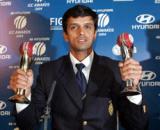
Former India coach Greg Chappell has ignited a fresh controversy in his newly-released book on Rahul Dravid, saying had the retired batting great received the same support that he gave other captains, he would have been the country's most successful skipper.
Chappell wrote that despite Dravid guiding the Indian team to a number of victories, his success was not enjoyed by some of the members of the side.
"Sadly the success of the team was not universally enjoyed within the team. Some individuals felt threatened by the new world order and appeared to work against Rahul," Chappell has written in his book 'Rahul Dravid - Timeless Steel', which was launched here yesterday.
"Had he been given the same wholehearted support in the role that he had given others, I think the recent history of Indian cricket may have been very different and he could have gone on to become the most successful Indian captain ever," he added.
The former Australian skipper recalled how Dravid led India to nine ODI wins in a row by inserting the opposition after winning the toss, regardless of the conditions, and then went on to pilot the team to a world record of 17 consecutive wins batting second.
"To learn how to get better at chasing a target, Rahul kept asking the opposition to bat first, no matter the conditions. Under his leadership, India won nine ODIs in a row against Pakistan and England, and went on to complete a world record of 17 consecutive wins batting second."
Stating that the same approach had helped India win Test matches abroad as well, Chappell wrote, "A similar approach to Test cricket brought about India's first overseas victory in the West Indies for 35 years and a first-ever Test victory in South Africa, which could have been turned into a series win if the team had batted better in the second innings in the final Test in Cape Town."
Chappell's reference is to India's Test series victory (1-0 in the four-match series) in the Caribbean in 2006 followed by its maiden win in Johannesburg's opening Test of the 2006-07 series, before Dravid's team lost the next two games and the rubber to the Proteas.
Dravid, who took over the reins of the national side when Greg Chappell was the coach, said he always had felt in command of the team contrary to the general belief that it was the controversial Aussie who ran the show.
"It was always my team. There is no doubt about that. Because Greg was a strong personality and because he himself was a great cricketer, because of the fanfare and publicity at times it could come across as it was his team," said Dravid about a tumultuous phase in Indian cricket.
"He (Chappell) can polarise a team with his strong personality. But I always thought it was my team. I never felt that he took a hard position when I wanted to do things differently," said the man nicknamed "The Wall".
"I thought he (Chappell) was a terrific man to talk batting with. He is the kind of a player who has grown up in a era of Australian cricket where they played the game and, at the end of the day, discussed the game. There was a lot that he could offer in terms of knowledge and experiences on how you could play the game," the 40-year-old former India star elaborated.
Dravid conceded that while he took up the leadership role with enthusiasm over the years he started to see it as a burden probably because of excess cricket combined with bad results, like India's early exit in the 2007 World Cup, and that forced him to quit the high-profile job.
"I took it up (captaincy) with enthusiasm, energy, passion and desire to do it. I felt at the stage when I gave it up that somehow over the period, it (desire) had gone, maybe because we played too much cricket then or some of the bad results we had.
"I was just not enjoying it. I was getting up in the morning of a one-day match thinking....oh there is another day of cricket today...and I have never felt like that before about cricket," he admitted candidly.
He acknowledged that he could have continued to captain the side longer had some of the results been better.
"Sometimes the results take a toll on you like the World Cup (2007)," he said.





Comments
Add new comment